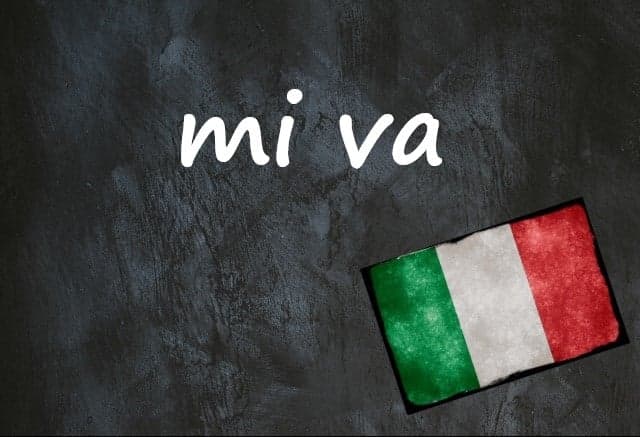Italian expression of the day: 'Mi va'

Do you fancy getting to grips with this casual phrase?
If you've studied some Italian, you’re probably already familiar with the verb volere, 'to want':
- voglio/vorrei un caffe
- I want/I would like a coffee
But there's more than one way to tell people what you want (or don’t want) in Italian, and one construction you’ll often hear used in informal situations is mi va.
The most literal translation is 'it goes to me', but what it really means is 'I feel like' or 'I fancy'.
You’d normally use it to talk about a desire that strikes you, rather than for carefully thought-out plans.
- Mi va di mangiare una pizza
- I feel like eating a pizza
Or, if you change the pronoun, you can use it to suggest things others might like, and to invite them to do so:
- Ti va di prendere un caffè?
- Do you fancy getting a coffee?
When used like that, it’s a more informal version of ti andrebbe.
It’s probably more common however to hear the negative form of mi va. For example:
- Non mi va di cucinare stasera
- I don’t feel like cooking this evening
- Non so se mi va di uscire
- I don’t know if I fancy going out
You can also use it as a casual (and polite) way of saying you don’t want something. For example, to get rid of a pushy street vendor, a simple “allora, non mi va” would work.
You might also hear mi va used in phrases like:
- Posso fare quello che mi va
- I can do what I want
Try not to get it mixed up with mi sa, which means 'it seems to me', or ma va', which could translate as 'No way!' or 'Get out of town!'.
Mi va means much the same as ho voglia di (meaning 'I feel like'.)
- Ho voglia di andare al centro stasera
- I feel like going into the centre this evening
Once you've mastered these phrases, you'll be able to use whichever one you feel like.
Do you have a favourite Italian word you'd like us to feature? If so, please email us with your suggestion.
Don't miss any of our Italian words and expressions of the day by downloading our new app (available on Apple and Android) and then selecting the Italian Word of the Day in your Notification options via the User button.
Comments (2)
See Also
If you've studied some Italian, you’re probably already familiar with the verb volere, 'to want':
- voglio/vorrei un caffe
- I want/I would like a coffee
But there's more than one way to tell people what you want (or don’t want) in Italian, and one construction you’ll often hear used in informal situations is mi va.
The most literal translation is 'it goes to me', but what it really means is 'I feel like' or 'I fancy'.
You’d normally use it to talk about a desire that strikes you, rather than for carefully thought-out plans.
- Mi va di mangiare una pizza
- I feel like eating a pizza
Or, if you change the pronoun, you can use it to suggest things others might like, and to invite them to do so:
- Ti va di prendere un caffè?
- Do you fancy getting a coffee?
When used like that, it’s a more informal version of ti andrebbe.
It’s probably more common however to hear the negative form of mi va. For example:
- Non mi va di cucinare stasera
- I don’t feel like cooking this evening
- Non so se mi va di uscire
- I don’t know if I fancy going out
You can also use it as a casual (and polite) way of saying you don’t want something. For example, to get rid of a pushy street vendor, a simple “allora, non mi va” would work.
You might also hear mi va used in phrases like:
- Posso fare quello che mi va
- I can do what I want
Try not to get it mixed up with mi sa, which means 'it seems to me', or ma va', which could translate as 'No way!' or 'Get out of town!'.
Mi va means much the same as ho voglia di (meaning 'I feel like'.)
- Ho voglia di andare al centro stasera
- I feel like going into the centre this evening
Once you've mastered these phrases, you'll be able to use whichever one you feel like.
Do you have a favourite Italian word you'd like us to feature? If so, please email us with your suggestion.
Don't miss any of our Italian words and expressions of the day by downloading our new app (available on Apple and Android) and then selecting the Italian Word of the Day in your Notification options via the User button.

Join the conversation in our comments section below. Share your own views and experience and if you have a question or suggestion for our journalists then email us at [email protected].
Please keep comments civil, constructive and on topic – and make sure to read our terms of use before getting involved.
Please log in here to leave a comment.